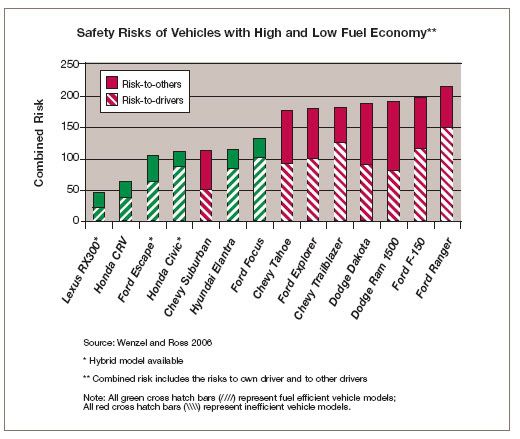
liberties with truth as he works to undercut movement forward on energy issues.
Let's take a look at Krauthammer's 
liberties with truth as he works to undercut movement forward on energy issues.
You get what you pay for.
When you build lighter cars with more fuel efficiency, you know that ultimately -- even with the best (let alone Chinese) technology -- safety is compromised.
How can we say this politely? Okay, THIS IS NOT TRUE. Got it, Chuck, you are stating commonly held ideas that are, well, wrong. All things being equal (safety features, design, materials), seems to make sense that heavier / larger would be safer (at least for the driver / passengers of the bigger vehicle), but (as is all too often the truth), all things are not equal.
Perhaps Krauthammer (or a Post fact-checker) could spend a few minutes reading DotCommodity's Small Cars Are Safer Than SUVs ...

The above comes from Increasing Vehicle Fuel Economy without Sacrificing Safety (pdf) which was prepared for the International Council on Clean Transportation.
The public, automakers, and policymakers have long worried about trade-offs between increased fuel economy in motor vehicles and reduced safety. The conclusion of a broad group of experts on safety and fuel economy in the auto sector: No trade-off is required. There are a wide variety of technologies and approaches available to advance vehicle fuel economy that have no effect on vehicle safety. Conversely, there are many technologies and approaches available to advance vehicle safety that are not detrimental to vehicle fuel economy.
In case that is not clear enough for putting Krauthammer's mendacity in context, let us see if this would provide some clarity:
experts? studies reveal important new conclusions about fuel economy and safety, including:
* Vehicle fuel economy can be increased without affecting safety, and vice versa.
* Reducing the weight and height of the heaviest SUVs and pickup trucks will simultaneously increase both their fuel economy and overall safety.
* Advanced materials can decouple size from mass (weight), creating important new for increasing both fuel economy and safety without compromising functionality.
(By the way, this is not the first time "experts" have come to this conclusion. See, for example, NRC: Effectiveness and Impact of CAFE Standards.)
Krauthammer works with urban legend, not fact, as he seeks to say that there is an unholy tradeoff that Americans face: certain risk to safety today (this false risk from smaller or lighter vehicles) versus an uncertain risk tomorrow (Global Warming, economic impact of imported oil).
By the way, as an aside, of course there is the real issue that lowering the weight of McSUVs would improve the safety for everyone else on the road.
Now we may, as a society, decide that the trade-off is worth it.
Krauthammer: But what we cannot deny is that there are trade-offs.
Krauthammer: What is fundamentally wrong with the energy bill the Senate passed last week and with the debate leading up to it is the chronic, almost pathological, refusal to recognize that there are such trade-offs.
Back to Chuck ...
Look at the major provisions of the bill. First, a mandated 40 percent increase in fuel-efficiency standards for automobile companies. What's wrong with that? Apart from the safety issue, there is the issue of cost. Car prices will rise. That could in turn drive one or all of the Big Three U.S. auto companies, all reeling financially, into insolvency.
Wow. 40 percent. Sounds so huge. Let's remember that this is by 2020, so it is less than 2 percent year. And, "apart from the safety issue", do we need to quote experts again?
But "Car prices will rise". This is an interesting question. What is "price"? Should we be thinking about the Cost to Buy or the Cost to Own? If the 'purchase price' goes up but operating savings pay for it in a short period, is the cost higher? And, well, there are so many things that drive car costs higher that become "standard" ever so quickly, from seat belts to radios, air bags to reclining (adjustable) front seats.
And, well, we should all be shaking. Increased fuel efficiency standards will driving the US auto companies into 'insolvency'? Not their bad designs, bad investment decisions, and inadequate vision for the future other than pursuing ever larger, ever less efficient vehicles in their McSUVing of America?
Let us return to Krauthammer:
That might be a worthy trade-off. This country desperately needs better gas mileage. But it does not come free. The most efficient and equitable way to both increase mileage and reduce gasoline use (increased mileage alone can induce people, perversely, to drive more) is with a new gasoline tax, refunded by means of reduced payroll taxes to make it revenue neutral. But there is absolutely no congressional or administration support for that, because it is too honest and open an acknowledgment that there is no free lunch. The reason Congress loves corporate average fuel economy (CAFE) standards is precisely that they hide the cost -- in the sticker price of a new car. Whatever blame there is for the unfairness of life -- that energy efficiency is not free -- goes to the auto company rather than the mandating body, namely Congress.
Cars and light trucks, projected to burn 46% of U.S. oil in 2025, can save over two-thirds of their fuel by artfully combining today?s best techniques?without compromise, with better safety and pep, at attractive cost, and with competitive advantage. [p 44]
What is the nightmare of CAFE standards? What is that Krauthammer is screaming about? A government mandate? What is he advocating? Using the market?
most efficient and equitable way to both increase mileage and reduce gasoline use ... is with a new gasoline tax
Now, to be clear, the 35 mpg by 2020 is a weak move forward, in my opinion. Richardson's Energy Revolution calls for 50 mpg. And, even that might be understated where we should and can go.
We need to turn, even for a short moment, to another part of Krauthammer's mendacity.
Mercifully, the Senate failed to pass a third proposed mandate from on high, a decree that power companies produce 15 percent of electricity from alternative sources by 2020. Because solar is expensive, wind is inconsistent in places such as the South, and geothermal is not exactly bubbling up in most states of the union, this mandate would have meant higher electricity prices.
Krauthammer finishes
I have no objection to paying more to reduce our dependency on foreign energy. But it is hard to conceive of a more politically dishonest and economically inefficient way to do it than with mandates that make private industry do Congress's dirty work, hide the true cost of energy efficiency and perpetuate the fantasy of the tax-free lunch.
But, who are you calling "dishonest", Chuck?

Ask yourself: Are you doing your part to ENERGIZE AMERICA?
* Krauthammer is far from the first (nor, sadly, likely to be the last) regular on Washington Post pages who gets away with such sweeping conclusions on fact-free basis. See, for example, my deconstruction of Fareed Zakaria's echoing Dick Cheney re the minimal benefits from energy efficiency. Or, J'accuse! Distorting reality in "Global Warming's Real Inconvenient Truth" about Robert J Samuelson's mendacity re energy/global warming issues.
* Are you coming to Yearly Kos? There will be an EA2020 panel along with a session on using the blogsphere for policy development. And, if headed that way, anyone interested in sharing transport to be EnergySmart en route?
* Well ... of course, ENERGIZE AMERICA
* And, Imagine Life Differently ... Imagine it Better ... and Seek to Create that Better Life ...
Cross posted from Daily Kos.